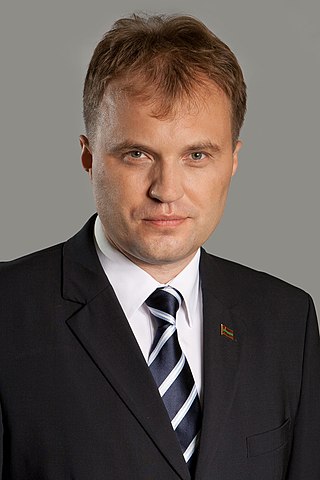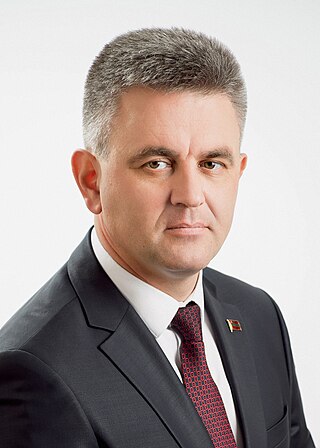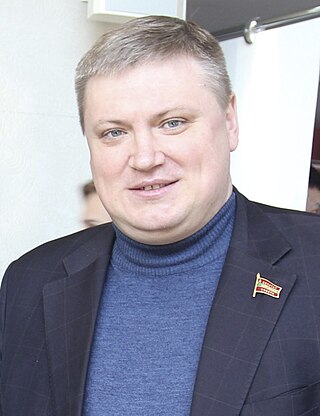
Transnistria, officially known as the Pridnestrovian Moldavian Republic and locally as Pridnestrovie, is a breakaway state internationally recognized as part of Moldova. It controls most of the narrow strip of land between the Dniester river and the Moldova–Ukraine border, as well as some land on the other side of the river's bank. Its capital and largest city is Tiraspol. Transnistria is officially designated by the Republic of Moldova as the Administrative-Territorial Units of the Left Bank of the Dniester or as Stînga Nistrului.

Igor Nikolaevich Smirnov is a Russian-born Transnistrian politician who served as the first president (1991–2011) of the internationally unrecognized Pridnestrovian Moldovan Republic.

The Transnistrian ruble is the currency of the internationally unrecognized state of Transnistria. It is divided into 100 kopecks.

Obnovlenie, officially the Republican Party "Obnovlenie", is a political party in the unrecognized state of Transnistria, an entity that is internationally recognized as part of Moldova. It has been the parliamentary majority in the Supreme Council since 2005.

The Transnistria War was an armed conflict that broke out on 2 November 1990 in Dubăsari between pro-Transnistria forces, including the Transnistrian Republican Guard, militia and neo-Cossack units, which were supported by elements of the Russian 14th Army, and pro-Moldovan forces, including Moldovan troops and police.

Valeriy Anatolievich Litskai was the foreign minister of Transnistria from 2000 until July 2008. He was born in Tver in Russia in 1949 and obtained Transnistrian citizenship after Transnistria declared independence. He is the head of the commission of negotiations of Transnistria and Moldova and also one of initiators of the Hague initiative on settlement of conflicts in CIS and executive secretary of the Community for Democracy and Rights of Nations.

Yevgeny Vasilyevich Shevchuk is a Transnistrian former politician who served as the second President of Transnistria, from 2011 to 2016.

The Transnistria conflict is an ongoing frozen conflict between Moldova and the unrecognized state of Transnistria. Its most active phase was the Transnistria War. There have been several attempts to resolve the conflict, although none have been successful. The conflict may be considered as having started on 2 September 1990, when Transnistria made a formal sovereignty declaration from Moldova.

The Patriotic Party of Transnistria was a political party in Transnistria.

The Communist Party of Transnistria was a communist party in Transnistria, led by Vladimir Gavrilchenko. It was described by state media as the more "conservative" communist party in comparison to the Transnistrian Communist Party (PKP).
Nadezhda Andreevna Bondarenko is a Transnistrian politician who has served as the acting chairperson of the Transnistrian Communist Party (PKP) since late 2018. She was formerly a police officer, and was the PKP's candidate for the 2006 presidential election. She is currently the editor-in-chief of the PKP's party newspaper, Pravda Pridnestrovya. She is of Russian and Ukrainian descent.
The mass media of Transnistria, the breakaway territory within the borders of Moldova, features both state-owned or supported outlets and opposition media. Publications are in Russian, with a single newspaper in each of the other two official languages, Moldovan (Romanian), and Ukrainian.

The Armed Forces of the Pridnestrovian Moldavian Republic are the military forces of the unrecognized state of Transnistria. The Armed Forces fall under the leadership of the Ministry of Defence. The Armed Forces were created on 6 September 1991 to maintain the sovereignty and independence of the Pridnestrovian Moldavian Republic, in accordance with Article 11 of the Republic's Constitution.

Parliamentary elections were held in Transnistria on 12 December 2010. All 43 seats of the Supreme Council of Transnistria were up for election. Transnistria uses first past the post with 43 single seat constituencies.

Presidential elections were held in Transnistria on 11 December 2011. As no candidate received more than 50% of the vote in the first round, a run-off was held on 25 December.

Vadim Nikolayevich Krasnoselsky is a Transnistrian politician who is the 3rd and current President of Transnistria. Previously, he served as a member of the Supreme Council of Transnistria from the 7th district, as 6th Speaker of the Supreme Council (2015–2016) and the 7th Minister of the Interior.

Oleg Olegovich Khorzhan was a Transnistrian politician who served as the chairman of the Transnistrian Communist Party and as a member of Transnistria's Supreme Council.

The government of Transnistria, a breakaway state internationally recognized as part of Moldova, has requested annexation by Russia numerous times. Transnistria is a territory that separated itself from Moldova due to fear of a possible unification of the latter with Romania. This sparked the Transnistria War, in which Russian-backed Transnistria managed to stay separate from Moldova. Despite this, today Transnistria is legally and internationally considered part of Moldova.
Viktor Anatolievich Gushan is a Moldovan–Russian businessman and former KGB officer.















